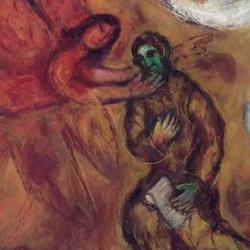INTRODUCTION
Isaiah calls the people “hear” Yahweh’s torah (Isaiah 1:10), and the whole passage is framed by references to Yahweh’s words (vv. 10, 18, 20). His main indictment against Judah is that they refuse to listen, and He responds by refusing to listen to them (v. 15).
THE TEXT
“Hear the word of the LORD, you rulers of Sodom; give ear to the law of our God, you people of Gomorrah: To what purpose is the multitude of your sacrifices to Me? Says the LORD. . . . ” (Isaiah 1:10-20).
SODOM AND GOMORRAH
Isaiah turns his attention from Judah as a whole to Judah’s rulers. They especially have turned Jerusalem into Sodom (Isaiah 1:10). When we think of Sodom, we normally think of sexual perversion, and that is what Genesis presents: The men of Sodom want to “know” the angels who visit (Genesis 19:1-11). Rampant homosexual desire is a sign of cultural decay (Romans 1:18-32). When the prophets speak of Sodom, however, they focus on pride, luxury, and unjust treatment of the poor (cf. Ezekiel 16:44-59). The sexual and political sins are related. In Genesis, Lot shows hospitality to strangers; the Sodomites want to rape the strangers. In Isaiah, the rulers have become rulers of Sodom by failing to provide justice to the weak and unprotected (1:17, 23). A city without justice is Sodom.
I HATE YOUR WORSHIP
Yahweh’s torah included extensive regulations and laws concerning sacrifice, and Yahweh wanted Israel to follow His instructions. But worship was never supposed to be independent of, or replace, obedience. When liturgy is allied with iniquity, it becomes disgusting to Yahweh. Instead of a pleasing aroma, burnt offers give Him “no pleasure” (1:11). Instead of accepting cleansing blood (1:11), Yahweh turns from people whose hands are full of blood (1:15). Instead of appearing before Yahweh, Judah’s assemblies just trample His courts (1:12). Instead of hearing prayer, Yahweh hides the eyes of His favor (1:15), and stops His ears to a people who has stopped its ears to Him. Isaiah is not rejecting worship per se, but announcing Yahweh’s scathing rejection of abominable worship.
WASH YOURSELVES
If Judah wants Yahweh to receive her and her offerings, she must repent (1:16), and specifically by providing justice for the weak and oppressed (1:17). Justice should be impartial (Exodus 23:1-4; Leviticus 19:15). The wealthy and well-connected can always buy fair treatment, so the test of a just society is whether or not the poor can get justice, and in that sense the rulers should be on the side of the widows and orphans (cf. Psalm 72, 82). Cleansing will not come by increasing the number of sacrifices, because Yahweh finds it repulsive. Cleansing comes by turning from evil. If Judah repents, she will get the restoration she seeks through sacrifice. Yahweh will cleanse her (1:18). Judah has a choice: Repent and eat the good of the land, or be eaten by strangers (1:19; cf. v. 7).
MERCY, NOT SACRIFICE
Yahweh hates Israel’s worship when it is corrupted by her disobedience and injustice (Jeremiah 6:19-20; 7:1-26; Hosea 6:6; Amos 5:21-27). This is not reversible: Yahweh never says He hates Israel’s justice because of liturgical infelicities. True religion consists in delivering widows and orphans in their distress, and keeping oneself unspotted by the world (James 1:27).










